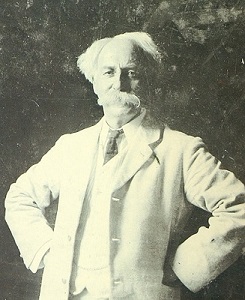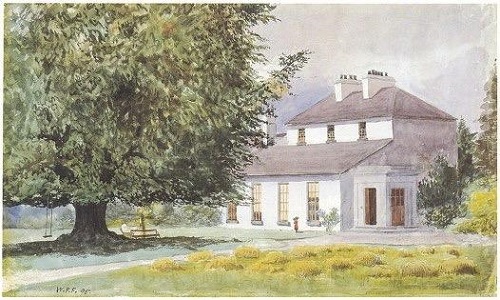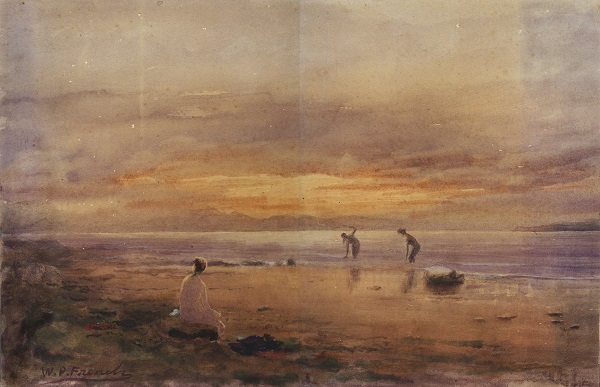Life
| 1854-1920 [William Percy French]; b. 1 May 1854, at Clooneyquin [Hse.; orig. a shooting-lodge, later enlarged when the family moved in after a fire in their own home], nr. Tulsk, Co. Roscommon - a house that passed to the Land Commission in 1906; son of a land-owner (‘stranded gentry’); ed. at Kirk Langley, Derbyshire; Windermere College; Foyle College (Derry), and TCD, 1876 (BA Engineering), 1881; wrote songs for a ‘smoking concert’ at TCD, 1877 and published “Abdallah Bubbul Ameer” under pseud. while still a student, rashly selling the royalties for £5 [var. failing to register; var. pirated and copyrighted by pubishe]; appt. to the Board of Works as a Inspector of Drains in Co. Cavan [engineer]; French became an accomplished and prolific water-colourist of ‘pot-boiling bog scenes’ in his own diffident phrase; first inspired by atmospheric effects of the Krakatoa volcanic eruption over Ireland; lost his post poss. through inattention to work; engaged in stage-life, painting and drawing classes, with a studio in Dawson St.; m. Kathleen [“Ettie”] Armitage-Moore ([b. 1871]; 2nd. dg. of William Armytage-Moore, br. of Countess of Annesley), 1890; lost Ettie and his dg. in childbirth, 1891; |
| ed. The Jarvey: The Irish Punch, a comic mag., which shortly failed (1889-Jan. 1891); turned to writing and professional entertainment; wrote tuneful songs, comic and sentimental, in Hiberno-English in the tradition of Samuel Lover; met his musical and stage collaborator W. Houston Collison [var. Collisson; later Canon Collison], 1891 - with whom he wrote his most enduring song “The Mountains of Mourne”, and co-authored The Knight of the Road (opera, 1891), a play produced in Dublin and later known as The Irish Girl (pub. [1918]; later gave charity performances with Collison during World War I; painted Irish scenes for George V; his best-known songs incl. “West Clare Railway”, “Slattery’s Mounted Foot”, “The Garden of Eden”, and “Phil the Fluther’s Band” (1888)- which Joyce evokes in Finnegans Wake; his books incl. Chronicles and Poems, Racquety Rhymes, Prose, Poems and Parodies (1925), and More Poems and Parodies; m. Helen May Sheldon (“Lennie”), 1894 - after an epistolary romance, with whom children Ettie, Molly and Joan; throughout his career was plagued by money-problems; succeeded in asserting the copyright entitlement to “Abdul Bulbul Ameer” after his death; |
| d. 24 Jan. 1920, of pneumonia [var. heart attack] at the home of his cousin in Formby [Merseyside], Lancs.; bur. in St. Luke’s Churchyard under a plain cross with enscribed plinth; his works were collected and edited by his sister Mrs. De Burgh Daly, as Prose, Poems and Parodies (1925); also collected as James N. Healy, ed., Percy French and His Songs (1966); the memory of his songs - so widely known to contemporaries - was dimmed by the cultural politics of Irish independence but perpertuated by the voice of Brendan O’Dowda, and revived by the scholar-pIrish Clayer Sam McCready in 2016; there is a seated sculpture of French by Alan Hall in Ballyjamesduff town square, the location associated with his song “Come Back, Paddy Reilly ..”; there is a Percy French Hotel in Strokestown, Co. Roscommon; his widow and dgs. said by Vivian Mercier (Irish Comic Tradition, 1962) to be ‘peculiarly dear’ to James Joyce, who parodied him extensively in Finnegans Wake while his germinal relation to that work was made the topic of a research work by Bernadette Lowry (Sounds of Manymirth...., 2022), construing that relationship as an exercise in jealousy on Joyce’s part; a sculpture by Alan Ryan Hall representing French seated in a stone sofa stands in the main square at Ballyjamesduff. PI DIW DIB DIL BREF JMC OCIL FDA |
 |
 |
| Percy French | Cloonyquin House, Co. Roscommon (by Percy French) |
| The Percy French Festival held annually at Castlecoote House, Co. Roscommon, was founded in 2009 and developed an annual conference in 2015. See Percyfrench.ie - online. ] |
[ top ]
Works
|
|
|
| A List of Songs Attributed to Percy French | ||
| “Abdul Abulbul Amir” (1877) “Andy McElroe” (1888) “Are Ye Right There, Michael?” (1897) “Come Back Paddy Reilly to Ballyjamesduff” (1912) “The Darlin’ Girl from Clare” “Donegan’s Daughter” (1908) “Drumcolligher” “Eileen Oge” (The Pride of Petravore)” “The Emigrants’s Letter”[“Cutting the Corn in Creeslough]” (1910) “Father O’Callaghan” (1910) “Fighting McGuire” “Flanagan’s Flying Machine” (1911) “The Fortunes of Finnegan” “The Girl on a Big Black Mare” “The Hoodoo” (1910) “I Fought a Fierce Hyena” “Jim Wheelahan’s Automobeel” “The Kerry Courting” (1909) “The Killyran Wrackers” (1914) “Kitty Gallagher” “Larry Mick McGarry” (1915) “Little Brigid Flynn” |
“Maguire’s Motor Bike” (1906) “The Mary Ann McHugh” “Mat Hannigan’s Aunt” (1892) “McBreen’s Heifer “The Mountains of Mourne” (1896) “Mick’s Hotel” “Mrs Brady” (1907) “Mulligan’s Masquerade” “The Night that Miss Cooney Eloped “No More of Yer Golfin’ for Me” (1906) “The Oklahoma Rose” (1910) “Phil the Fluther’s Ball” “Pretendy Land” (1907) “Rafferty’s Racin’ Mare” (1906) “A Sailor Courted a Farmer’s Daughter” (parody of the folk song) “Slattery’s Mounted Fut” (1889) “Sweet Marie” “Tullinahaw” (1910) “When Erin Wakes” (1900) “Whistlin’ Phil McHugh” “Who Said the Hook Never Hurted the Worms?” |
|
—from the Wikipedia article on Percy French [online; 05.03.2016]. |
||
| See also the list given at Percy French (Ireland) | ||
| “Come Back, Paddy Reilly” “The Mountains of Mourne” “The Emigrant’s Letter” “Phil the Fluter’s Ball” “A Fairy Song” “People I Don’t Want to Meet” “Ach, I Dunno!” “McBreen’s Heifer” “Ballymilligan” “Innismeela” “The Road to Ballybay” “The End of the Holiday” “Rafting Down the Rio” “Later On” “To E. R.” “Things that Matter” “Eileen Oge” “The Fisherman’s Wife” “Not Lost But Gone Before” |
“‘A Reaction’” “George Grossmith” “In the Studio” “Galloping Hogan” “An Irish Mother” “The Four Farrellys” “To the West” “The Kindly Welcome” “In Exile” “Whistlin’ Phil McHugh” “Mrs. Brady” “Rafferty’s Racin’ Mare” “The Queen’s Advice to Lord Zetland” “The Queen’s After-Dinner Speech” “Gortnamona” “Song of William, Inspector of Drains” “The Mary Ann McHugh” “Come-All-Ye” |
|
| —Percy French.ie [online] | ||
[ top ]
|
See also Vivian Mercier, ‘Joyce and the Irish Tradition of Parody’, in The Irish Comic Tradition (Cork: Mercier Press 1957) [extract as attached]. |
Pictures: There was an exhibition and catalogue as Oliver Nulty, Lead Kindly Light: 35 Years of Percy French at the Oriel Gallery (Dublin: Oriel Gallery, 2002). |
[ top ]
Commentary
Bernadette Gorman, author of Sounds of Manymirth on the Night’s Ear Ringing (2021) - quotes Finnegans Wake (1939): ‘Parsee French writer of annoyingmost letters and skirriles ballets who is Magrath’s thug and smells cheaply of Power’s spirits and he is not fit enough to throw guts down to a bear...’ - and asks ‘Some mouthful straight from the mouth of JSJ surely? So who is Magrath???’
Further: ‘What was his problem and obsession with Percy French and why did he so carefully fillet his library of all the Percy French material he manifestly consulted? Also why did he spend months in the UK in 1923 the year after The Chronicles of [Percy French] were published? Another question, did he raid his father’s files on the Chapelizod distillery, carried from rented house to rented house and did he discover that it was the Chapelizod Distillery that Percy French lost his considerable savings in? In a word, did John Joyce rob Percy French?’ (Quoted by Peter Chrisp on his Finnegans Wake blog - online; accessed 28.12.2022.)
[ top ]
| Songs | Poems |
| “The Mountains of Mourne” | |
|
Oh I’ve seen them meself and you could not in truth There’s beautiful girls here, oh never you mind |
| “Are Ye Right, There, Michael?” | |
|
Are ye right there, Michael, are ye right? Have ye got the parcel there for Mrs. White? Ye haven ‘t, oh begorra, Say it’s comin’ down tomorra — And well it might now, Michael, So it might. At Lahinch the sea shines like a jewel, With joy you are ready to shout, When the stoker cries out, There’s no fuel, And the fire’s taytotally out. But hand up that bit of log there — I’ll soon have ye out of the fix; There’s fine clamp of turf in the bog there. And the rest go a-gatherin’ sticks. Spoken: And while you’re breakin’ bits of tree, You hear some wise remarks like these — Are ye right there, Michael? Are ye right? Do ye think that you can get the fire to light? Oh an hour you’ll require, For the turf it might be drier — Well it might now, Michael, So it might. |
| “Gortnamona” | |
|
Now if you go through the woods of Gortnamona, You hear the raindrops creeping through the blackthorn tree; But oh, it is the tears I am weeping, weeping, weeping, For the loved one that is sleeping far away from me. |
| “Come Back, Paddy Reilly” | |
|
My mother once told me that when I was born Now most newborn babies appear in a huff The baby’s a man now, he’s toil-worn and tough |
| [ See further lyrics - attached. ] | |
| Songs | Poems |
| “If I Should Die Tonight” | |
|
But when |
| “To The West” | |
|
And its welcome I’ll be, for no longer I’ll meet |
| “Celestial Painting (Sunset At Renvyle)” | |
|
|
| “Remember Me” | |
|
[ The above poems and songs above are given at Poem Hunter - online; accessed 05.03.2016. ]
Fogeys: “I was born a boy and have remained one ever since. Friends and relatives, often urge me to grow up and take an interest in politics, whiskey, race meetings, foreign securities, poor rates, options and other things that men talk about, but no - I am still the small boy messing about with a paintbox, or amusing myself with pencil and paper, while fogies of forty determine the Kaiser’s next move.” (See Percy French website - online; accessed 05.03.2016.]
| “The Queen’s After-Dinner Speech” |
||
|
“ ‘twas like comin’ home,” sez she, “An’ me heart fairly glowed,” sez she, “Along the Rock Road,” sez she, “An’ by Merrion roun’,” sez she, “To Buttherstown,” sez she, “Till I came to the ridge,” sez she “Of the Lesson Street Bridge,” sez she, “An’ was welcomed in style,” sez she, “By the beautiful smile,” sez she, “Of me Lord Mayor Pile,” sez she. “(Faith, if I done right,” sez she, “I’d make him a knight,” sez she). “Well, I needn’t repeat,” sez she, “How they cheered in each street,” sez she, “Till I came to them lads,” sez she, “Them ‘undergrads’,” sez she. “Indeed, an’ indeed,” sez she, “I’ve had many a God-speed,” sez she, “But none to compare,” sez she, “Wid what I got there,” sez she. “Now pass the jug,” sez she, “And fill up each mug,” sez she, “Till I give a toast,” sez she, “At which you may boast,” sez she. “I’ve a power o’ sons,” sez she, “All sorts of ones,” sez she: “Some quite as cows,” sez she, “Some always in rows,” sez she, “An’ the one gives most trouble,” sez she, “The mother loves double,” sez she, “So drink to the min,” sez she, “That have gone in to win,” sez she, “And are clearin’ the way,” sez she, “To Pretoria to-day,” sez she. “In the ‘Gap o’ Danger’,” sez she, “There’s a Connaught Ranger,” sez she, “An’ somewhere near,” sez she, “Is a Fusilier,” sez she, “An’ the Inniskillings not far,” sez she, “From the Heart o’ the War,” sez she; “An’ I’ll tell you what,” sez she, “They may talk a lot,” sez she, “And them Foreign Baboons,” sez she, “May draw their cartoons,” sez she. “But what they can’t draw,” sez she, “Is the lion’s claw,” sez she, “And before our flag’s furled,” sez she, “We’ll own the wurruld,” says she. |
|
|
Open in separate window - as attached. |
||
[ top ]
| D. J. O’Donoghue, The Poets of Ireland (Dublin: Hodges Figgis 1912) incls. FRENCH, WILLIAM PERCY, and lists Racquety Rhymes, illustrated by R. C. Orpen (Dublin, 1888); The Fall of Fitzwilllam, by our own Strolling Homer, illustrated by R. O. Orpen (a skit on the Fitzwilliam Square Tennis Tournament), Dublin - with remarks: |
|
| O’Donoghue, op. cit., p.154. |
Stephen Brown, Ireland in Fiction: A Guide to Irish Novels, Tales, Romances and Folklore [Pt. I] (Dublin: Maunsel 1919), lists The First Lieutenant and Other Stories (1890). BREF notes that he is primarily a painter, and that his water-colours are in demand on modern markets.
Seamus Deane, gen. ed., The Field Day Anthology of Irish Writing (Derry: Field Day Co. 1991), Vol. 2 selects Chronicles and Poems, ‘The Mountains of Mourne’ [104]; Prose, Poems and Parodies, ‘Are Ye Right There, Michael’ [104-05]; 114, BIOG.
Harry Boylan, Dictionary of Irish Biography (1988 edn.): ed. Foyle College and TCD; Board of Works, drains, Co. Cavan; ‘The Mountains of Mourne’; lost capital in unwise distillery investment; The Jarvey failed after a year [var. 1889 - January 1891]; The Knights written with Dr. Collisson, success at Queen’s Theatre; toured Canada, USA and West Indies and England with Collisson; ‘West Clare Railway’ led to libel action by directors; ‘I am still the small boy messing about with a paintbox.’ Moved to London in 1890 and died at Formby, Lancs.
Robert Hogan, ed., Dictionary of Irish Literature (1979) notes that he accompanied his songs on the banjo; viz., ‘Come Back, Paddy Reilly’; ‘Phil the Fluter’s Ball’; The Golden Years, in the 1950s, based on his life and songs. Justin McCarthy, Irish Lit., gives ‘The first Lord Liftinant’.
Irish Arts Review : Price Guide to Irish Art (Sept 2000-Aug. 2001) lists paintings: A Sailing Ship in Harbour; James Adam; 27 Sept. 2000; £15;000; other titles [mostly in range £3;000-6;000]; inc. A Wooded Pathway; Bogland Landscape; Sailing Boats; Two Fishermen in a Currach; Bogland in West of Ireland; Penmaenmawr from the Chapel [at] Gogarth Anglesey; Sunburts over the Bog; Seascape; Pathway through the Forest; In Donegal; Peat Stacks; War Torn France - Ypres; Connemara Landscape; Cottages in the West; December 1st 1912; Coastal Scene - West of Ireland; West of Ireland Coastal Scene with Cottage; A footbridge in an Extensive Landscape; An Evening on the Moor; Connemara Landscape; Cottage in a landscape; Portrush; Co. Antrim [£10;000]; Sun setting over a Lough & Coastal Scene [pair]; The Grey Ass; View of Bundoran; Bog Scene with conifers; Coastal Scene with Boat; Meandering Stream in a Hilly Landscape; River Scene; West of Ireland Landscape; Out Fishing at Kylemore Abbey.
Emerald Isle Books (Cat. 95) The Mountains of Mourne (1939); Phil the Fluter’s Ball (London & Dublin 1937); Little Bridget Flynn (London: Prowse 1947); Prose, Poems and Parodies (Dublin: Talbot 1962, 1964).
Belfast Public Library holds Prose, Poems and Parodies (1925), and three other titles.
[ top ]
Notes
Emily Lacy de Burgh, a sister, lived in China through the Opium War and Boxer Rebellion and wrote of her adventures there; see A. A. Kelly, ed., Wandering Women, Tow Centuries of Travel out of Ireland (Wolfhound 1995).
Are you right?: Purportedly French was sued by the West Clare Railway Co. for libelling them in his song “Are Ye Right There Michael”, and, on arriving late in court, was questioned by the judge on the reasons for his doing so, only to respond, “Your honour, I travelled by the West Clare Railway” - a rejoinder that resulted in the case being thrown out. [See Wikipedia’s article on Percy French - online.]
Ballyjamesduff: ‘... famous for being in the Percy French song “Come back Paddy Reilly to Ballyjamesduff“, which was written about a man from the area who acted as Jarvy (coach driver) for French and decided to emigrate to Scotland. It is said that he drove his horse and cart to Carrick-on-Shannon, parked the horse and cart outside the railway station and took the train to Dublin. Legend has it that the horse ran all across Ireland looking for Paddy, until Paddy Reilly was said to have returned. Paddy Reilly is now supposedly buried in St Joseph’s graveyard, in the town of Ballyjamesduff.’ [See “Ballyjamesduff” in Wikipedia - online.]
Picture Sales: "Mayo Mermaids" by Percy French sold for €44,000 euro at Whyte"s Gallery in Dublin in 2005
 |
| “Mayo Mermaids” by Percy French. (Available at Robin Hutton - Flikr online.) |
[ top ]